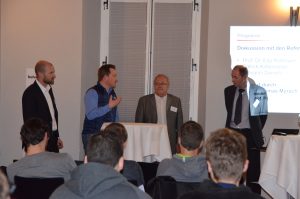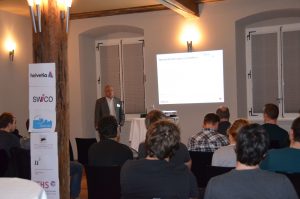Smart cities – 20. TEWI-Forum
Urbanisation is advancing. Today, more than half of the world’s population lives in cities, and by 2050 this figure is expected to rise to two-thirds. Cities form highly complex living spaces in whose organisation modern information and communication technology plays an important role. The concept of smart cities is a response to the economic, social and political challenges of post-industrial society.
Since an urban space cannot be sharply delineated, these developments also have an impact on neighbouring spaces, which will increasingly integrate into and align themselves with urban regions. For the Valais, one could speak of “smart valleys” in this context.
At the 20th TEWI Forum, the audience gained an in-depth insight into the potential and application of smart cities. Competent experts from research and practice presented the topic from different perspectives and discussed the opportunities and risks they entail.
The introductory lecture by Prof. Dr. Edy Portmann, Assistant Professor of Information Science, dealt with the topic “What are smart cities?” Smart cities are currently on everyone’s lips, mostly without any clarity as to what exactly is meant by this. The introductory lecture therefore first sharpened the vague term. It then presented European efforts and best practices for the realisation of smart cities. The presentation concluded with an outlook into the future of cognitive cities.
You can find the whole presentation here.
Afterwards, Patrick Kaltenreider, assistant at the Institute of Information Systems, presented a prototype for a smart city app. Existing mobile apps (e.g. Google Now) support smart city users with tips and suggestions. Based on the ideas of existing apps, the app under development by the team of the Institute of Information Systems focuses on decision support. The presentation showed the history of the development and the current version of the app.
You can find the whole presentation here.
Then Prof. Dr. Giovanni Danielli, Professor in Tourism and Mobility at the HES-SO Valais-Wallis and member of the Mobility Lab at the HES-SO, presented the “smart city” project Nose. With the NOSE project (a Nomadic, Modular, Scalable IT Platform for Pervasive Sensing), the HES-SO Valais-Wallis, in collaboration with Postauto Switzerland, is researching the question of how “smart city” type services can also be made available in peripheral regions. With technical equipment, Postauto can be in a position, for example, to collect area-wide data on street lighting, road conditions, parking space utilisation, environmental conditions and tourist data and make them available to the public.
You can find the whole presentation here.
Finally, a discussion with the speakers followed, which was moderated by Prof. Dr. Thomas Myrach. The discussion was intended to address various interesting aspects from the presentations and to discuss them controversially. It offered the audience the opportunity for questions and comments.
The discussion round can be found here.

moderated by Prof. Dr. Thomas Myrach

the “smart city”-project Nose
